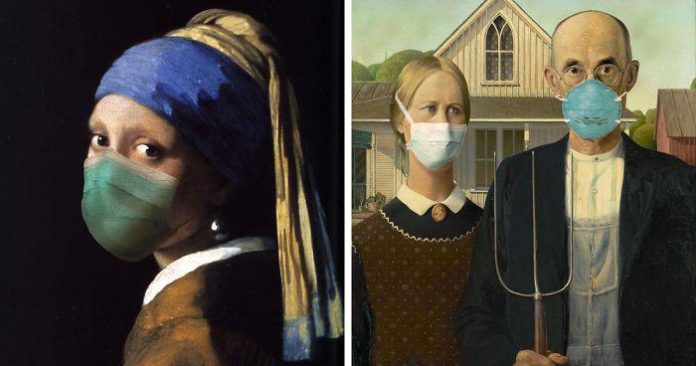Written by guest columnist Conlan Salgado:
I am sixteen years old; I don’t know much. There are two ways people who don’t know much are able to learn more: one way is by reading the literature of others, but the second way is simple observation of people’s behaviors. Now I have been reading quite a lot of late, partly (all right, primarily) because I’ve been constrained to spending my life entirely inside. The observation of people is slightly hampered at the moment, since there aren’t many people to observe these days. All of them are shut up by self-decree or by government-decree. But as I was sitting for the 16th straight, damn day inside reading Ernest Hemingway (to keep up my spirits), I got to wondering why exactly I and the rest of humanity were confined to 2900 square feet or less for the next month. And I don’t mean to talk of the government’s authoritarian nose-intruding actions. I mean to talk of why the people of this Country have participated in the flamboyant hysteria liberally spread about by the cultural institutions. And yes, I do think the reaction to this is overblown; now, by this, I mean the social reaction, primarily the attitude indulged in by the populace. I could provide statistics of all the sicknesses and tragedies that seem far more deadly than this Coronavirus (historically too), but I have tried as such in my daily arguments with friends; it does not work. As it turns out, feelings don’t care about your facts. Now let us look at the main players in this fiasco: the government, and the government. And Big Government, and getting bigger by the minute. So, I do conclude that the government must have something significant to do with this, but what is most curious is the common man’s relation to government, because this relationship feeds the suffocating ambition of the government. There is an old, parabolic story which I will modify because I think it succinctly illustrates the position government now occupies in culture. This is the story: A man hears of a magnificent volcanic eruption not so far from where he lives; he hears that phreatic explosions have caused a tsunami, and it is expected to hit where he lives in two days or less. So, of course, he goes outside and sits; a car drives past with fleeing people, who offer to provide him a lift, but he says to them, “The Government will save me”, and they drive on. A helicopter flies over and also offers to provide him an escape, but he answers, “Government will save me,” and off the helicopter flies. When, at the end of all eternity (yes, it will likely take that long for Big Government to corrode), the government meets the man at the gates of hell, he asks it, “Where were you to save me from my death?” Big Government’s response is: “We kept our end of the bargain. Total control over your life. And that means when you die, too.” Now, as dramatic as my adaption may come off, it conveys several necessary ideas: The first idea is that Government is now God. This, I would say, has been keenly, almost obsessively observed over the past four decades, but a truth worn by redundancy is still a truth. Government being God, it has usurped the primary office of God, which is Salvator, or Savior (as to that idea, I would not mind crucifying a great many bureaucrats on Capitol Hill). However, saviors are only needed in times of crisis, perhaps in a, say, existential event. And existential events supply one other necessary aspect for humanity: deep, deep meaning. Soul-deep meaning, ultimate-cause meaning, meaning as deep as the human capacity for thought. Now, this is not America; America, really the West, is a culture stuffing itself stupid with trappings. Trappings buttered all up with more trappings, trappings that make one an intellectual couch-slug. But occasionally the common man will awake to himself, realize he is not a zoo animal but a human being, and demand gut-deep, existential meaning. This moment, I contend, is one of those times. Now our culture, as I say, has a predisposed attraction to trappings, and so it often, in its good intention and once in a while to seek meaning, bumbles and indulges in even more of the same empty trappings. This, I contend, is also one of those times because Coronavirus does not provide gut-deep meaning, but it does bear with it some appealing trappings. One of them is life and death; another is sickness and health; another is potential economic crisis. And what could possibly seem deeper, more existential, than life and death? Now this situation also conveniently satisfies the governmental vocation of Cosmic Superhero, Savior God, sweeping in to save the world from wide-spread death and destruction: To prevent the economy crashing, we will turn socialist; to prevent death, we will turn dictatorial. And not only this, each fellow on the street is even able to assist our Bureaucratic Divine Avenger by playing a small role, a very small role. Forfeit one’s constitutional rights, and distance oneself from any human contact. Until Divine Government Avenger tells us the mission is accomplished. Coronavirus wears death more flamboyantly than any other sickness of recent times, and this, I contend, is why people have chosen it as the anno-generational cataclysmic, meaning-bestowing event. Modern Culture has distracted itself for such a period of time from death, and life, and discomfort, that it views any mention of the matter as disconcertingly out of the ordinary. People simply don’t bother contemplating the true number of deaths in this country from other causes; those are too difficult to discern amongst the mass-media fluff world in which people suffocate so slowly now. And the question may be raised, why did such a uniform response arise from the people? It is because, in our epoch, people lack the ability to create images by their own minds, and so they remain impotent to think of themselves. They are only able to think with the images that are provided them; they are like puppets for our media institutions. People, for the next month, can put off movie theatres and Starbuck’s and shopping at the mall, and stay constrained within their own abodes thinking of how they—though they be only regular, common people—are helping to conquer this terrible, end-times-plague-like-health-scourge. Superheroes then, all of us. Because what could be more existential than dying from a virus? Besides going on with our lives, of course.















